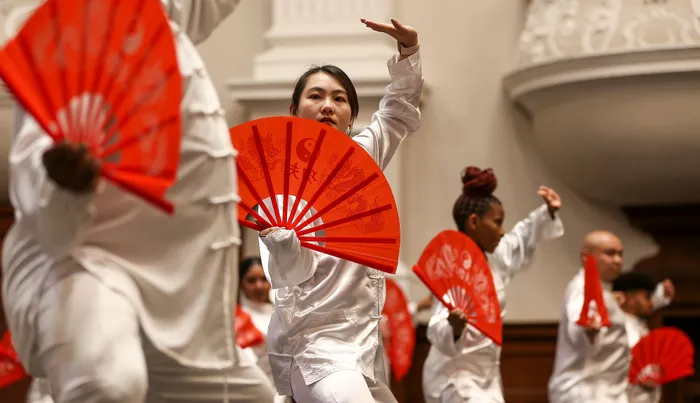
China’s Mid-Autumn Festival is an important festival.
Image: Leon Lestrade / Independent Newspapers
As the country celebrates Heritage Month to reflect on its rich diversity, a vibrant tapestry of cultures has woven itself into the nation's collective identity.
Among these, the Asian community has stood as both a historic and modern pillar of cultural exchange and contribution. And while Heritage Month celebrates the richness of South Africa’s heritage, it also shines a spotlight on communities like the Chinese-South Africans, whose presence has profoundly shaped the country's multicultural landscape.
Recent Statistics South Africa (StatsSA) revealed from the Mid-Year Population Estimates (MYPE) 2025 report that of the estimated 63.1 million population, the majority is Black African, with about 51.6 million people — roughly 82% of the total population.
The white population is estimated at 4.5 million, while 5.3 million people identify as coloured and 1.6 million as Indian or Asian.
Although still a minority group, the country has a significant population identifying as Asian, particularly Chinese-South African, and Korean-South African. The origins of the Chinese community in Southern Africa can be traced back to the 19th century.
On a micro-level, the Chinese community in South Africa is even more complex, with three distinct groups.
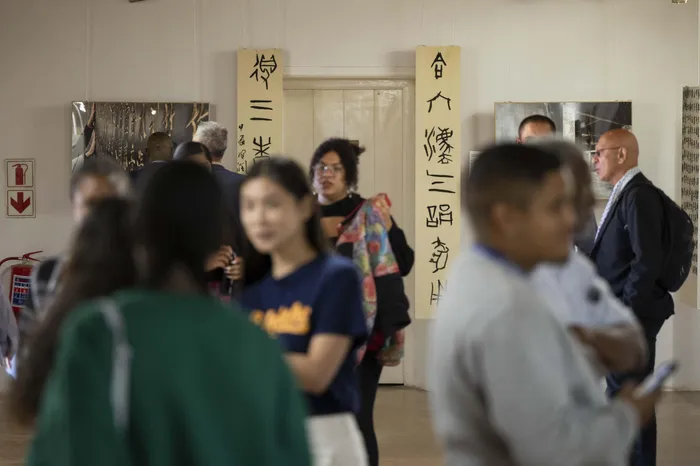
While ‘International Chinese Language Day’ takes place on April 20, a number of dignitaries and cultural lovers attended the unveiling of the ‘101 Wishes: The Beauty of Chinese Characters’ exhibition at Iziko Learning Centre at Groot Constantia earlier this year.
Image: Armand Hough / Independent Newspapers
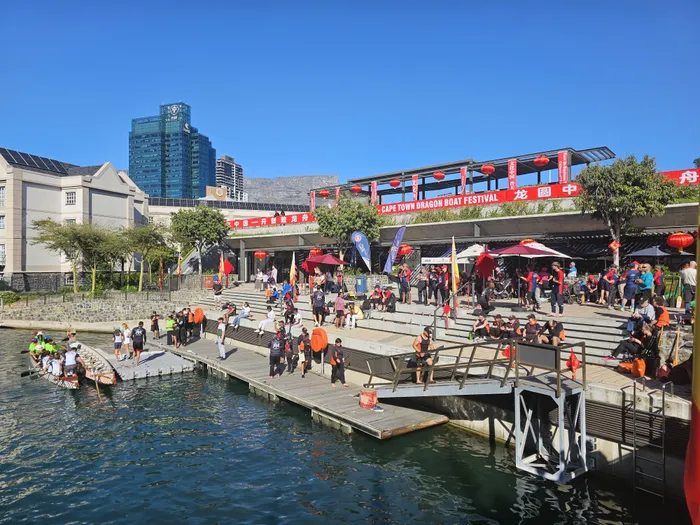
The Cape Town Dragon Boat Festival.
Image: Theolin Tembo
Director of the Confucius Institute at the University of the Western Cape and Chairperson of the Chinese Students and Scholars Association in South Africa, Dr Iris Wu, who has called Cape Town home for 23 years, said that over the years, several small family businesses, restaurants, and community associations have made SA their home.
“More recently, post-1990s migration has brought entrepreneurs, professionals, and students. These waves of migration have woven Chinese traditions — language schools, festivals like Spring Festival and Mid-Autumn Festival — into South Africa’s vibrant multicultural tapestry, creating a distinct Chinese-South African identity that is both historic and contemporary.
“For me, being Chinese-South African is a living blend of heritage and environment. It is not a simple ‘half-half’ identity, but a dynamic integration: honouring Chinese values such as respect for elders, education, and community service while embracing South Africa’s openness, diversity, and democratic spirit. Daily life naturally reflects both — family dumpling dinners alongside braais with friends, for example,” Wu said.
With the rise of social media, it has allowed many within the minority communities to gain visibility and speak to the nuances of their identity and experience.
While he may not yet be a household name, full-time international model Jonanthan Forlee, 30, certainly has become a household face, having appeared in campaigns and billboards with a number of e-commerce sites and established fashion brands.
Forlee is a third-generation Chinese-South African who grew up in Brackenfell, Cape Town. He was previously a data analyst, but is now signed with an agency, Kult South Africa, and models globally.
“In my younger days, I represented the South African National basketball teams in the Under-16, U-18, U-20 and student games, as well as played in the Basketball National League for the Cape Mountaineers.”
Speaking of his dual identities, Forlee said: “Growing up, I never really thought I was different from other kids, simply living as a South African child. In my formative years, I had some challenging experiences, since I came to realise my differences from everyone around me, which has become a unique identity that I’ve celebrated more in later life.
“As a youngster, I never felt like I had to cling to my Chinese heritage. Both my parents are Chinese and were born in South Africa, so a lot of the traditions and lessons were from their upbringing as South African third culture kids. Things like music, food, and activities were all proudly South African, to put it simply.
“One thing my mom forced me to do when I was 10 years old was to play in the Chinese community’s basketball team. Which was something she had grown up with. I hated it — I used to make excuses and pretend I was sick so I didn’t have to take part,” Forlee said.
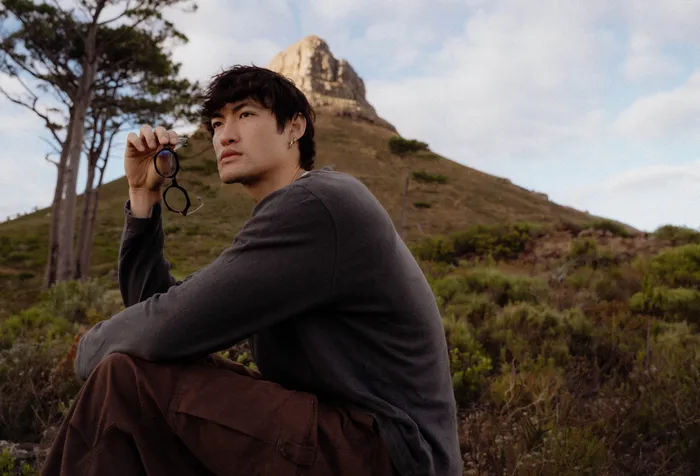
Model Jonathan Forlee.
Image: Kult Agency South Africa / Supplied
“Looking back, I’m so grateful that she’d done that because sport became a huge part of my life, gave me numerous opportunities, and gave me a lot of confidence throughout my life. Moreover, I got to be around other Chinese people who also had the shared experience of growing up Asian in South Africa.”
Wu added that sometimes there can be a misconception that the Chinese-South African community is closed or insular.
“In reality, we are deeply involved in civic life — partnering with local charities, schools, and universities, and participating in multicultural festivals. Many of us, myself included, have built lifelong friendships across all communities.
“One enduring legacy is the community’s commitment to education and mutual support. Chinese language schools and weekend cultural programmes have been operating in Cape Town and other cities for generations,” Wu said.
For Forlee, he said that growing up in Brackenfell — a predominantly Afrikaans neighbourhood in Cape Town — “was somewhat of a difficult experience mainly because of children’s lack of familiarity with Chinese people”.
“Every other day I would hear the odd stereotypical remark or things like ‘Jackie Chan’ or ‘Bruce Lee’; not that bad, because those guys are the coolest, right? As a kid, though, these were annoying comments that would drive me crazy. At the end of the day, I think there’s just a lack of representation in South African media,” Forlee said.
He joked that perhaps “we need my dad to speak Afrikaans on 7de Laan”.
Forlee added that one other thing both he and his sister remember is that food was a big topic of anxiety while at school.
“I remember there were many occasions where I would bring Chinese food to school for lunch. I was always met with some odd looks and, oftentimes, the odd rude remark. However, Chinese cuisine has become so popular now. And unfortunately, my sister and I — and I’m sure many other Asian kids — had to go through something similar in their schooling years.”
His remarks were echoed by Korean-South African Yewon Choi, who has also been gaining traction on social media with over 27,000 followers on TikTok. Choi is Korean-born, but has lived in South Africa for over 22 years.
“I still remember opening my lunchbox at school with 불고기 (bulgogi) with rice while everyone else had sandwiches. Back then I felt out of place, but now I see it as something that makes me unique.”
The Korean Cultural Centre SA spokesperson for the centre, Jaeil Lee, said South Africa has seen a clear rise in enthusiasm for Korean culture, fuelled by the global popularity of K-pop and K-dramas.
“Many visitors to our centre mention how they find surprising connections between Korean traditions and local cultures — for example, shared values like respect for elders and a community-oriented spirit that resonates with Zulu traditions,” Lee said.
“I personally believe that while cultures may appear different or exotic on the surface, there are always universal elements we can relate to.”
Choi, meanwhile, said that being Korean-South African feels like “carrying two homes in my heart”.
“My Korean roots are always with me, the food, the language, the values I was raised with, but Cape Town has shaped me just as much… Some days I lean more into my Korean side, other days into my South African life, and together they make me who I am.
“There are moments when my Korean side is reduced to a stereotype, or when my South African identity is questioned because I do not ‘look’ South African enough. I remember when I was younger, people would often ask, ‘But where are you really from?’ which made me feel like I did not fully belong. Over time, I have learned to see both sides as part of me, and I carry that with pride,” Choi said.
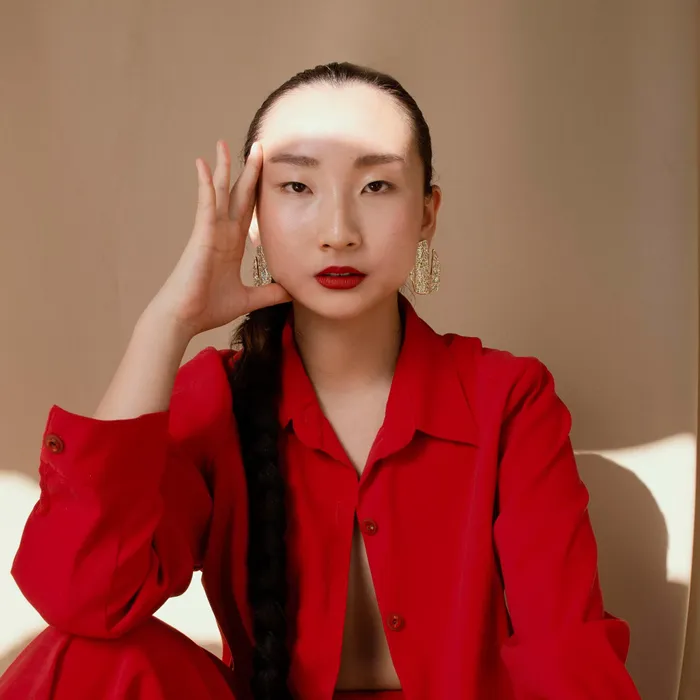
Yewon Choi.
Image: Facebook / Supplied
She also further highlighted how integral the experience of bonding over food has been.
“For us, gathering around the table is never just about eating. It is about connection, storytelling, and holding onto our roots. Even here in South Africa, Korean barbecue with friends becomes more than a meal. It is a space where we celebrate our culture and invite others to experience it with us.”
Wu added that a way for fellow South Africans to build connections with the Asian communities is as simple as being curious and open to learning.
“Attend public celebrations like Chinese New Year events or Mid-Autumn Festival gatherings. Seven Confucius Institutes at different universities in South Africa offer language and organise cultural activities, two universities have Chinese medicine and acupuncture programmes,” Wu said.
“Even a simple visit to a local Chinese market or cultural performance can spark friendships. Mutual respect and genuine interest are the keys to building lasting connections.”
Forlee added that it is as simple as making any new friend.
“Just be kind and treat people as you’d like to be treated. If you aren’t sure about certain cultural differences, ask.
“At the end of the day, we’re all human. Doing life for the first time. If there’s ever a chance to celebrate similarities/differences, wins/hardships, we should do so proudly and unapologetically.”
theolin.tembo@inl.co.za
Related Topics: